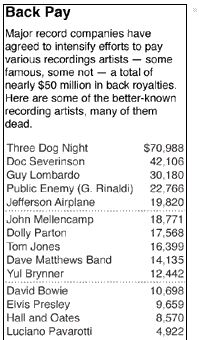The New York Times > Technology > Circuits > What’s Next: Playing Old Records (No Needle Required):
“The real excitement for me is that the method has the potential to rescue recordings,” said Daniel P. Sbardella, a sound engineer at the Rodgers and Hammerstein archives of recorded sound of the New York Public Library for the Performing Arts. A recording could even be scanned in bits and pieces, Mr. Sbardella said, and then converted to audio files that can be edited to reconstruct the whole recording.
“The mission of a sound archive is to preserve as much sound as possible,” he said, “so even if that means rescuing a few seconds that are one of a kind, it’s really worthwhile.”
Interesting. When you consider how many perfectly usable recordings are archived but not accessible, I wonder if these rescued recordings — the libraries will likely make them available as part of their mission — will serve as a goad to the RIAA cartel to liberate similar artifacts from their vaults.
Hey, a music lover can dream . . .
